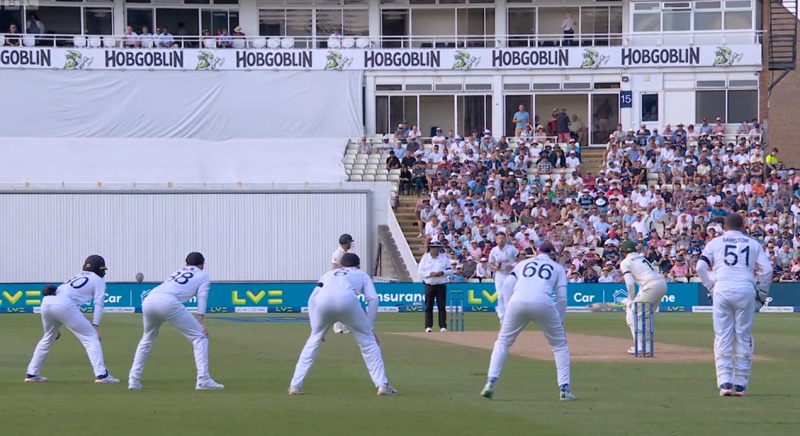Few declarations pass without public complaint, but Ben Stokes’ first innings declaration in the first Test of the 2023 Ashes was more controversial than most. People complained when it happened and then they really complained when England lost.
England were 393-8, Joe Root was on 118 and Nathan Lyon had just conceded 20 in an over. There were two overs to go until the second new ball became available.
And Stokes declared.

Any assessment of what might have happened had Stokes not declared is purely hypothetical, but it certainly felt like England would have scored a few more runs.
Batters are most vulnerable in the first few balls after coming out though and England’s captain saw this as an opportunity to have two such goes at Australia’s openers: four overs that night and then again with an as-good-as-new ball the following morning.
On Test Match Special, Michael Vaughan stated almost as a fact that England would have scored “30 or 40 runs” for those last two wickets. We can’t know that. They might only have scored 10, or Ollie Robinson and James Anderson could have been dismissed off the next two balls.
Stokes’ declaration was a gamble. England didn’t take a wicket in those four overs so it didn’t pay off, but we don’t actually know how much the gamble cost.
Hindsight says that given England didn’t take a wicket, they should have batted on. But then hindsight could also say that given Usman Khawaja ultimately made 141 and bowling at him with the new ball after a full day in the field represented the best opportunity to get him out, maybe Ben Stokes should have declared sooner.
Other “wrong” decisions

Although the outcome of a Test match is decided mathematically, scorecards are not mathematical formulae. You can’t look at them after the fact and plug in different numbers to get a different result. Games are steered by the decisions the players make and each decision takes the match down a different road.
Declaring eight wickets down to give yourself four overs at the opposition before the close of play takes the match one way. Batting on and making a few more runs takes it a different way.
What people sometimes overlook is that this goes for every decision. And you know what? An awful lot of decisions are made over the course of a five-day Test match. Like an absolutely crazy, uncountable number.
A lot of the “wrong” decisions that you don’t notice are also way more significant than the timing of a declaration. We can all spot a shit shot, but even a single instead of a two means a different batter on strike and a whole different timeline. Missing out on that run might actually save a batter bizarrely.
More obviously, just think about some of the decisions that came immediately after that declaration. Stokes gave those four overs to Stuart Broad and Ollie Robinson.

To some people, Stokes declaring with only eight wickets down lost England the Test. However, it feels just as significant to us that Stokes spurned James Anderson that evening.
Indulging in simpleton maths on that scorecard we could argue that Usman Khawaja lbw Anderson for 0 would have been worth way way more than a handful of Joe Root slogs in the two remaining overs before Robinson and Anderson got cleaned up by the new ball. What a terrible decision, what moronic captaincy, what did he think he was doing?
Or maybe Jimmy wouldn’t have wheedled out Khawaja in those 12 balls. But that doesn’t mean the same hypotheticals don’t also apply for every single bowling change from then on – and there were many.
Every change in tactic matters, every minor field change could potentially swing the game – it’s just much, much harder to get a sense of what these decisions are worth. It’s not just a run saved here or conceded there; it’s wickets and emotions and – dare we say it – momentum.
It’s not that Stokes’ declaration gamble didn’t matter; it’s that it was just one of a great many probably-worth-about-30-runs decisions that were made one way or another by various players throughout the course of the match. To pick out that one as being some kind of out-and-out stinker overlooks that. (It also overlooks the huge benefits had the plan actually worked – which it could have.)
Yes, Stokes’ first innings declaration decided the match. But so did everything else.
Great barrelling bucket hats, you need the King Cricket email in your life. Find out all about it here
And here’s our Patreon page which explains how the site works and what it’s about.



People who stray from ‘conventional’ wisdom and fail are always more likely to be criticised than people who follow the ‘accepted’ approach and fail.
I am very sad that we missed the chance to hear what Shane Warne would have said about the declaration though.
As Bert said under the last post: “It makes sense to them, that older way of playing … all that is important is that test cricket continues to be exactly the same as it used to be.”
It also occurs to us that there are an awful lot of people who are drawn to the negative element of any given thing like moths to a flame. Plenty of good people can’t help but focus on faults and problems, imbuing them with far greater importance than all of the upsides. We guess that tendency is always going to be more apparent when the team has lost.
I’d actually go as far as to say Australia have bigger problems than England, as we head to Lords. They now know that Stokes is predictably unpredictable, which is the most confronting there to their collective egos. Look at the frothing about Ollie Robinson. Rattled, because they know they didn’t, and won’t, make the running in the series for once.
They are at the mercy of the ginger gods for the next few weeks.
And by any conventional metric, Hazlewood, Boland and Green all got collared – Lyon too in the first innings really.
On the ‘negative thinking’ thread, it has been instructive to listen to both the Test Match Special podcast and the Sky Sports one.
Agnew, Vaughan and to a lesser extent Cook and Rainford-Brent are quick to wring their hands and point out flaws, problems, mistakes, what-ifs. Mel Jones, Eoin Morgan and Sangakkara prefer to focus on the joy of the game and what a fascinating series this could develop into.
The different timeline is what people who say Foakes would have saves the match, dont seem to get. Foakes wouldn’t have had those chances. It’s all different.
Matthew Hayden has been talking again.
On Ollie Robinson: ‘He’s a forgettable cricketer. A fast bowler that is bowling 124 (kph) nude nuts and he’s got a mouth from the south. Someone like him, you can just go, ‘Brother, I’m coming at ya’.
Hah. He’s such a caricature. Possibly the least self-aware person in human history. Robinson will probably do all right in this series. Just adds to the feeling that Aus are a bit rattled/don’t like it up em.
England would probably have won if they didn’t show a tendency to drop a decent minority of the catches they were offered.
Or if they didn’t bowl a million no-balls.
The irony being that 124kph nude nuts is essentially the only type of bowling Hayden could actually deal with.
This is reasoned, sensible stuff that cuts through all the irritating nonsense elsewhere in a measured fashion. It’s like journalistic bazball. Not sure I approve quite frankly.
This website’s USP of not having especially strong feelings one way or another isn’t quite the same lure as Bazball though, audience-wise.
I find this website delightfully, whimsically, unpredictable.
Shove it up your arse! King Cricket is the best web site in the whole world.
Always sensible, editorial and comment material alike.
We’ll take whimsically unpredictable. Ta.
I see Leicestershire are imploding and all their half decent players are leaving. Probably to Durham.
At least in these turbulent times some things remain constant.
Reassuring almost.
Rehan to Notts, nature is healing etc
Badger Nixon placed on ‘gardening leave’.
Sounds ideal really. Can I have a little bit of gardening leave?
Usually, for a batter, it’s a leave and then they do a bit of ‘gardening’.
I can’t spake. Shove it. Middlesex is the best T20 side in the whole world. Surrey isn’t.
Very much agree with this, Yer Maj. The reason I’m not so fussed about declaration points usually is that it’s basically a runs/time tradeoff where time is worth different amounts at different times, if that makes sense. But it’s just one of many ways that the side can alter the runs/time tradeoff, eg by trying to up the run-rate with the bat, or by setting a more defensive or attacking field when bowling. If they wanted to book out that slot of bowling time just before the close, on the grounds of the value of getting two chances with the cherry with fresh bowlers, that’s not unreasonable and there are chances to “recover the lost runs” or “decelerate the game-time to make up for the declaration having accelerated it” later, by trying to dig in and consolidate a bit more in the next batting innings. There’s also value to optionality when by this later time you’ll have more information – about the weather, how the opposition did in their innings etc – in that you might decide it’s better to double up on the declaration and try to accelerate the game again if that’s the only way to force a result. And the risk of optionality – that you might fail in your attempt to execute that later choice.
We are in the realms of what cleverclogs like Ged might call “real options” and the “value of (im)perfect information”. That possibility of messing up the third innings might lead the risk-averse to prefer taking runs they’re reasonably confident are on offer right now. The other side of this equation is that batting on in the first innings until the tenth wicket falls will eat up game-time – and if weather and the length of the opposition innings go against you then you may regret having let so much time slip. You could end up finding the only way to set the opposition a meaningful target within a time you can realistically bowl them out would require scoring at an uncomfortably high run-rate throughout the third innings. If your priority is ensuring there’s time in the game (especially one you know may be affected by rain) to take all twenty wickets and force a win, then declaring (especially before a prime bowling slot) is arguably the risk-averse option.
Aside from the imponderability of the what-ifs, that we don’t know how the other choices would have turned out and therefore how much e.g. a declaration (but also less visible choices about how quickly batters press the accelerator or how defensive the bowling tactics are) really costs in terms of runs and time, these decisions are also all interlinked, or at least later decisions depend on the outcomes of earlier ones. This complicates any post mortem analysis, and declarations made on day one are more complicated than third-innings declarations. For the latter, the risk-reward ratio of the target you set is more straightforward to evaluate and a lot of the optionality – your ability to reach for the “undo” button – is lost. If you see the opposition racing towards the target and you realise you left them too much time, you can try to slow things down and bowl more defensively, but you no longer have the power to change the runs equation with the bat. Aside from what Yer Maj has sagely said about declarations getting over-analysed because they’re so visible, whereas many other decisions that alter the game to a similar degree are more easily overlooked, I’d suggest first- and second-innings-of-a-match declarations get too much attention because people are so used to more legitimately critiquing third-innings declarations. Analysis of those earlier declarations should be made only with a big dollop of “nobody really knows” – not just what would have resulted if the choice had been made differently, but what chances the declaring team retained to unwind some of the effects of that decision should they regret it later.
Safer ground than arguing “what would have happened if…” is examining the logical coherence of a decision within the context of other choices being made around the same time. You could make a decent case that if England were set on having at least four overs against the Aussie openers that evening, they should have told the batters to start having a proper swipe a bit earlier, instead of only putting the pedal down after Root’s century and just before the declaration. That could well have ended up with the batters all out for a similar total to the one they ended up declaring on, but gained a few more valuable overs before the close. Or they could have ended up not losing a wicket, and either declaring at the same time with a few more runs in the bank or with a similar score and a few more overs to bowl. Or they could have got all out earlier and for a lower score, with the trade-off of getting a few more overs in. The outcome of having a swipe sooner wouldn’t have been guaranteed, and for the sentimentals and statisticians it would have put Root’s chance of completing a century at risk. But it would have been more consistent with the logic of declaring.
Unfortunately most of the declaration criticism I’ve seen has been of the “they could have scored 20-50 more runs, somehow nothing else in the game would have changed at all, and those runs would have made Australia’s fourth innings target ungettable” variety. “If seeing 7 or 8 wickets go down had led them to believe there was no point batting into the second day, and they were now committed to bowling a few overs before the close, they should have backed up that decision by telling the batters to step on the gas a few overs earlier” seems to be a niche position, despite not being reliant on so many what-might-have-been.
I’ll take “cleverclogs like Ged”, ta!
I’m not sure I’m clever enough to deploy real option theory with much insight on the first innings declaration question.. In theory, because the uncertainties are greater in the first innings than in each subsequent innings – the third being the most common declaration innings – the value of the real option to continue batting (ie not declare) would be relatively high. Hence the controversial nature of Stokes’s first innings declaration.
If you look at old first class and test scorecards from the fifties and sixties, declarations at 7, 8 or 9 down were relatively common. Bowlers weren’t expected to deliver many runs and those they delivered came slowly. Uncovered pitches made the variation in batting conditions more extreme than they are now. Still, declaring late on day one to leave the other team with an awkward 20-30 minutes and to give one’s own team two bites of the new cherry was fairly standard practice.
Yes, first class matches were shorter back then (three days), requiring more funk around declaration than most tests. But this 2023 Edgbaston test was a very flat pitch and the expectation was the loss of a day of cricket at least to rain.
That declaration was not some bizarre concoction – it was an innovative decision only because, in recent times, such decisions have become very unusual in those particular circumstances.
Very few people are talking about the counter measures that the Aussies deployed – slowing down the over rate to a penalty-inducing extent. Lyon bowled around 1/3rd of the Aussie overs on Day One but still we lost 6 overs from the day even after taking the full 30 minutes for failing to manage 15-per-hour.
My rating: 8/10 to Stokes for the tactical innovation, but it would have been 10/10 had England taken a wicket on Day Obe and then won the test. 1/10 to the Aussies for the “slow down beyond reason” tactic -it would have been 0/10 had the Aussies lost the match.
Yes I think this is right. If you bat on too long in the first innings and in retrospect discover you overdid the runs but need to bring more time into the game, you can always declare earlier in the third innings (and build your batting strategy around the premise that you’re going to do that, so hopefully your batters will be able to score at an appropriate rate). But if you discover you declared too soon in the first, you can’t guarantee recovering those runs in the third. So you need to have a good reason not to bat on in the first.
On the other hand, The King is right to say Stokes had correctly judged the value of snaffling an opener was very high, and in a sense Khawaja’s feats vindicate his decision. I’d add to that the point you make about time in the game. England were clearly trying to accelerate the game more than Australia, and certainly more than Khawaja(!)
For reasons I never understood, cricket captains often claim not to be making decisions based on weather forecasts – notably unlike F1 team managers, another results-driven business where weather plays a big role in the outcome. But with the expectation of lost time to rain, England’s decision to accelerate the game was logical (though I don’t think it was coherent with the relatively cautious batting in the run-up to Root’s century and the quick bash before the declaration) and the analogy to three-day games of yore is valuable. The expected gain in time from declaring wasn’t just the time saved from the two English wickets sacrificed, but from the time taken out of the Australian innings if a wicket or two fell. Indeed it Khawaja had gone in that spell, the Australian innings would have been a lot shorter in terms of time as well as runs. People only seen to be concentrating on the runs, but time was clearly the half of the equation that was occupying England’s minds.
England lost not because of the declaration but because of Jonny Bairstow. As proof, I offer the third picture in this article. It is conventional wisdom that as the ball is being bowled, the keeper and the slip fielders should assume a stance which permits their buttocks to be in the maximally clenched position. While the slip fielders are executing this admirably, Jonny seems to be taking a run-up himself, obviously under the illusion that the field is misaligned by 180 degrees and he is the one bowling. Specifically, there is no butt-clench to be seen from the man. This is highly irresponsible and it is no surprise that no fast bowler would hit lengths that would permit a wicket-keeper catch under these circumstances thinking it would obviously be spilled.
Jonny Bairstow is a saggy-butt delusionist.
Good slogan. Put it on a T-shirt.
There’s an Ascent of Man quality to the cordon on that photo.